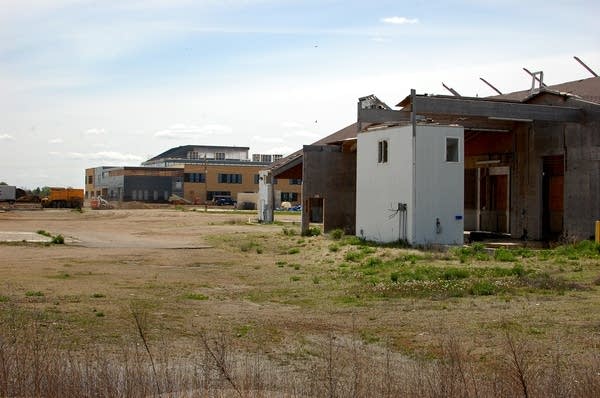Bonding package doesn't include some local projects

On a quiet neighborhood street, City Councilman Don Niles can still see where most of the damage occurred from a devastating tornado that struck Wadena two years ago.
"What we're looking at are about eight empty lots that formerly had homes on them," Niles said. "I would estimate that we have around 25 vacant lots in town at this point, and they're not selling very quickly."
The June 17, 2010, tornado destroyed more than 200 homes and businesses in Wadena, along with the town's municipal pool, ice arena and community center. Town leaders had pinned their hopes for rebuilding on state financing.
But this week, the legislature removed many local projects from a $500 million construction finance measure. Missing from the bill signed by Gov. Mark Dayton is a list that includes civic centers in St. Cloud, Mankato and Rochester, and a new St. Paul Saints baseball stadium.
Create a More Connected Minnesota
MPR News is your trusted resource for the news you need. With your support, MPR News brings accessible, courageous journalism and authentic conversation to everyone - free of paywalls and barriers. Your gift makes a difference.
Lawmakers also struck money for a new community wellness center in Wadena from the package. Wadena had raised about half of the $10 million needed for the project — seen as one of the keys to the town's ongoing recovery — through insurance claims and private fundraising. Town leaders wanted the state to pay for the rest as part of this year's bonding package.
Dayton initially proposed about $164 million toward economic development projects. The House version included about $83 million. In the end, lawmakers gave $50 million and the authority to determine priorities to the state Department of Employment and Economic Development. Communities can reapply to the agency for money to fund projects.
Wadena officials had already received money to plan and design their community center. But Niles said it is unclear whether funding will be there to build it.

"Our need to begin rebuilding of the wellness center is critical," he said. "And to the extent that we're looking at an unknown process with unknown timing, with potentially multiple competitors for a limited pool of funds, that's very troubling."
Without the planned community center, it will be more difficult to sell the town's empty lots, local realtor Curt Folkstead said.
Folkstead said the legislature has historically decided on local projects, especially ones involving disaster recovery.
"They turned this into a political football, in my estimation... where they put a pool of money there and then just let a few people decide," he said. "I would have liked to see the legislature vote on it completely and not just kind of pass the buck."
Some lawmakers say there was good reason to move some decisions on how to fund major projects from the halls of the Capitol to the Department of Employment and Economic Development.
The move was designed to eliminate earmarks — those pet projects that lawmakers often push to keep their constituents happy, said state Rep. Larry Howes, R-Walker, chairman of the House Capital Investment Committee.
But some lawmakers disagreed. During the bonding bill debate, state Rep. Steve Drazkowski, R-Mazeppa, called the pot of DEED money a "slush fund" and a "blank check" for the Dayton administration.
But for Howes, allowing the agency to make such decisions using criteria that include job creation and economic development is more objective. He said it removes politics from the process.
"That doesn't mean that a governor or president can't do something that might appear to be political," Howes said. "And even if you do something that's not political, someone will think it appears to be. There's always that chance. But with the legislature it's definitely political."
The change took Department of Employment and Economic Development Commissioner Mark Phillips by surprise. He said the broad criteria outlined in the bill may have to be refined.
Phillips said priority would likely be given to shovel-ready projects that create construction and other jobs this year. But there's clearly not enough money to go around for all of the projects that will line up for funding.
"This will be particularly difficult because they're high profile projects like civic centers and baseball stadiums," Phillips said. "That makes it more difficult. It's not the fact that we can't take a set of criteria and evaluate proposals... It's the high profile nature of the stuff."
He said it's unclear how long it will take for the state funding to flow to selected projects.
